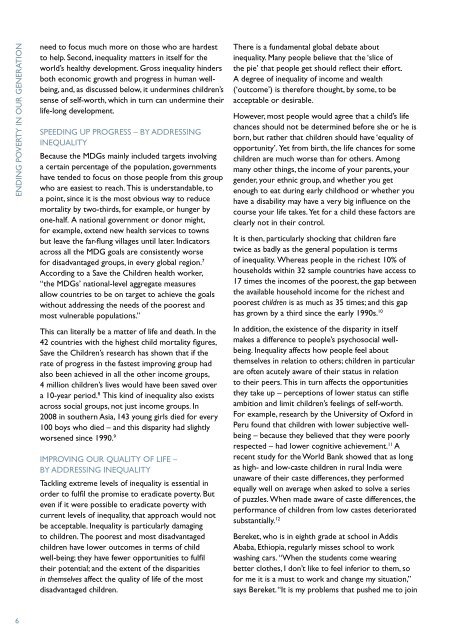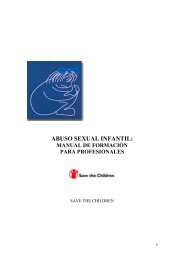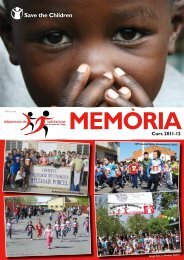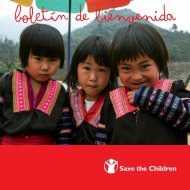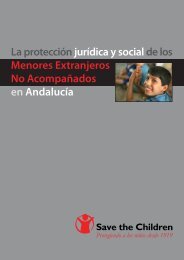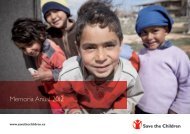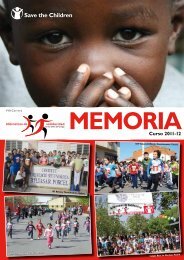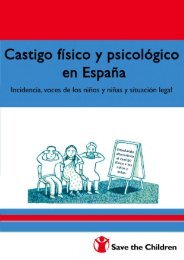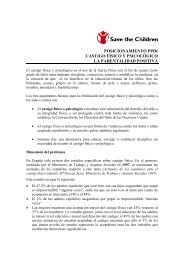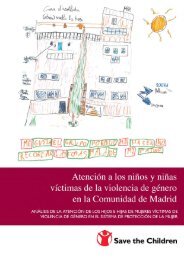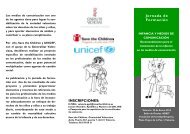ENDING poverty - Save the Children
ENDING poverty - Save the Children
ENDING poverty - Save the Children
You also want an ePaper? Increase the reach of your titles
YUMPU automatically turns print PDFs into web optimized ePapers that Google loves.
<strong>ENDING</strong> POVERTY IN OUR GENERATION<br />
need to focus much more on those who are hardest<br />
to help. Second, inequality matters in itself for <strong>the</strong><br />
world’s healthy development. Gross inequality hinders<br />
both economic growth and progress in human wellbeing,<br />
and, as discussed below, it undermines children’s<br />
sense of self-worth, which in turn can undermine <strong>the</strong>ir<br />
life-long development.<br />
SPEEDING UP PROGRESS – BY ADDRESSING<br />
INEQUALITY<br />
Because <strong>the</strong> MDGs mainly included targets involving<br />
a certain percentage of <strong>the</strong> population, governments<br />
have tended to focus on those people from this group<br />
who are easiest to reach. This is understandable, to<br />
a point, since it is <strong>the</strong> most obvious way to reduce<br />
mortality by two-thirds, for example, or hunger by<br />
one-half. A national government or donor might,<br />
for example, extend new health services to towns<br />
but leave <strong>the</strong> far-flung villages until later. Indicators<br />
across all <strong>the</strong> MDG goals are consistently worse<br />
for disadvantaged groups, in every global region. 7<br />
According to a <strong>Save</strong> <strong>the</strong> <strong>Children</strong> health worker,<br />
“<strong>the</strong> MDGs’ national-level aggregate measures<br />
allow countries to be on target to achieve <strong>the</strong> goals<br />
without addressing <strong>the</strong> needs of <strong>the</strong> poorest and<br />
most vulnerable populations.”<br />
This can literally be a matter of life and death. In <strong>the</strong><br />
42 countries with <strong>the</strong> highest child mortality figures,<br />
<strong>Save</strong> <strong>the</strong> <strong>Children</strong>’s research has shown that if <strong>the</strong><br />
rate of progress in <strong>the</strong> fastest improving group had<br />
also been achieved in all <strong>the</strong> o<strong>the</strong>r income groups,<br />
4 million children’s lives would have been saved over<br />
a 10-year period. 8 This kind of inequality also exists<br />
across social groups, not just income groups. In<br />
2008 in sou<strong>the</strong>rn Asia, 143 young girls died for every<br />
100 boys who died – and this disparity had slightly<br />
worsened since 1990. 9<br />
IMPROVING OUR QUALITY OF LIFE –<br />
BY ADDRESSING INEQUALITY<br />
Tackling extreme levels of inequality is essential in<br />
order to fulfil <strong>the</strong> promise to eradicate <strong>poverty</strong>. But<br />
even if it were possible to eradicate <strong>poverty</strong> with<br />
current levels of inequality, that approach would not<br />
be acceptable. Inequality is particularly damaging<br />
to children. The poorest and most disadvantaged<br />
children have lower outcomes in terms of child<br />
well-being; <strong>the</strong>y have fewer opportunities to fulfil<br />
<strong>the</strong>ir potential; and <strong>the</strong> extent of <strong>the</strong> disparities<br />
in <strong>the</strong>mselves affect <strong>the</strong> quality of life of <strong>the</strong> most<br />
disadvantaged children.<br />
There is a fundamental global debate about<br />
inequality. Many people believe that <strong>the</strong> ‘slice of<br />
<strong>the</strong> pie’ that people get should reflect <strong>the</strong>ir effort.<br />
A degree of inequality of income and wealth<br />
(‘outcome’) is <strong>the</strong>refore thought, by some, to be<br />
acceptable or desirable.<br />
However, most people would agree that a child’s life<br />
chances should not be determined before she or he is<br />
born, but ra<strong>the</strong>r that children should have ‘equality of<br />
opportunity’. Yet from birth, <strong>the</strong> life chances for some<br />
children are much worse than for o<strong>the</strong>rs. Among<br />
many o<strong>the</strong>r things, <strong>the</strong> income of your parents, your<br />
gender, your ethnic group, and whe<strong>the</strong>r you get<br />
enough to eat during early childhood or whe<strong>the</strong>r you<br />
have a disability may have a very big influence on <strong>the</strong><br />
course your life takes. Yet for a child <strong>the</strong>se factors are<br />
clearly not in <strong>the</strong>ir control.<br />
It is <strong>the</strong>n, particularly shocking that children fare<br />
twice as badly as <strong>the</strong> general population is terms<br />
of inequality. Whereas people in <strong>the</strong> richest 10% of<br />
households within 32 sample countries have access to<br />
17 times <strong>the</strong> incomes of <strong>the</strong> poorest, <strong>the</strong> gap between<br />
<strong>the</strong> available household income for <strong>the</strong> richest and<br />
poorest children is as much as 35 times; and this gap<br />
has grown by a third since <strong>the</strong> early 1990s. 10<br />
In addition, <strong>the</strong> existence of <strong>the</strong> disparity in itself<br />
makes a difference to people’s psychosocial wellbeing.<br />
Inequality affects how people feel about<br />
<strong>the</strong>mselves in relation to o<strong>the</strong>rs; children in particular<br />
are often acutely aware of <strong>the</strong>ir status in relation<br />
to <strong>the</strong>ir peers. This in turn affects <strong>the</strong> opportunities<br />
<strong>the</strong>y take up – perceptions of lower status can stifle<br />
ambition and limit children’s feelings of self-worth.<br />
For example, research by <strong>the</strong> University of Oxford in<br />
Peru found that children with lower subjective wellbeing<br />
– because <strong>the</strong>y believed that <strong>the</strong>y were poorly<br />
respected – had lower cognitive achievement. 11 A<br />
recent study for <strong>the</strong> World Bank showed that as long<br />
as high- and low-caste children in rural India were<br />
unaware of <strong>the</strong>ir caste differences, <strong>the</strong>y performed<br />
equally well on average when asked to solve a series<br />
<br />
performance of children from low castes deteriorated<br />
substantially. 12<br />
Bereket, who is in eighth grade at school in Addis<br />
Ababa, Ethiopia, regularly misses school to work<br />
washing cars. “When <strong>the</strong> students come wearing<br />
better clo<strong>the</strong>s, I don’t like to feel inferior to <strong>the</strong>m, so<br />
for me it is a must to work and change my situation,”<br />
says Bereket. “It is my problems that pushed me to join<br />
6


